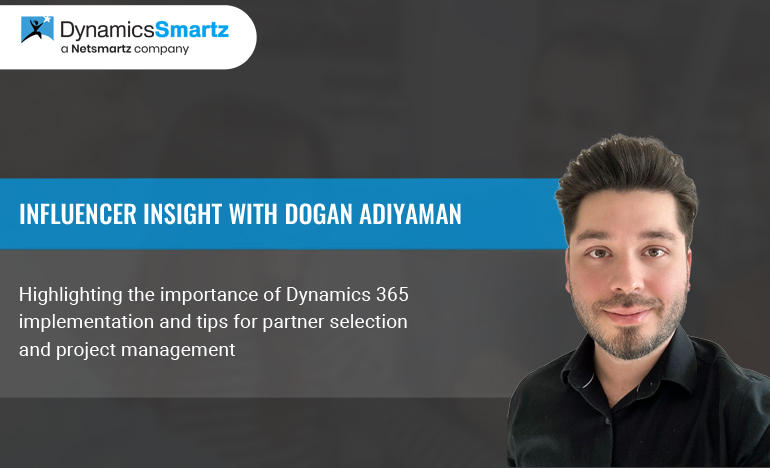Microsoft Dynamics Influencer Insights
Microsoft Dynamics 365 Solution Architect and MCT, Dogan Adiyaman Take on Microsoft Dynamics 365 and ERP Implementation
Dynamics 365 has become a highly sought-after solution for companies looking to streamline their operations and improve efficiency. The rise of Dynamics 365 indicates a shift in the technology landscape towards cloud-based, modular, and scalable solutions that can be tailored to fit a company's unique needs.
Our Influencer Insights segment invites renowned industry leaders to discuss emerging technology developments, P2P relationships, and Microsoft Business Solutions.
During our conversation with Dogan Adiyaman, we learned how Microsoft is revolutionizing the industry and what technology trends to watch out for in 2023.

Who did we interview?
Dogan Adiyaman is a Dynamics 365 Controls/Security Manager in the ERP Risk and Automation Services practice who helps in seamless digital transformation. With 13+ years of progressive experience in various Microsoft ERPs from Axapta 3.0 through Dynamics 365 Finance and Operations, he works as a Microsoft Certified Solution Architect.
Apart from being a Microsoft Dynamics AX Consultant, he is a blogger at dynamics365clouderp, a platform that presents digital transformation experiences as the result of D365FO applications in the supply chain and sample scenarios for R&D purposes.
Let Us Quickly Get To Our Expert’s Point Of View.
Question 1- What, according to you, are some of the top Microsoft technology trends to watch out for in 2023?
There is no one-size-fits-all answer to this question, as Microsoft is investing in a wide range of technology trends, such as AI (artificial intelligence), cloud computing, IoT, edge computing, and mixed reality.
Microsoft's heavy use of machine learning in business applications to improve operational efficiency, customer engagement, and decision-making makes it one of the top trends in 2023.
Machine learning algorithms can analyze large amounts of financial data, identify patterns, and predict future trends. For example, machine learning can be used to analyze financial transactions to detect and prevent fraudulent activities. It can also automate manual tasks, such as account reconciliation or scanning documents through its cognitive services platform, which can help reduce errors and improve the efficiency of financial processes.
What's particularly impressive is how Microsoft has integrated these technologies into its business application solutions, enabling businesses to leverage the latest innovations to improve their operations and decision-making.
Question 2: What opportunities would you be looking at this year?
As someone who has recently made a career change from ERP implementation to ERP security, some opportunities I would be looking at next year include gaining additional training and certification in the latest security technologies and best practices, networking with other professionals in the field to stay up-to-date on the latest trends and challenges, and identifying and pursuing opportunities to work with organizations that are looking to improve their ERP security postures, such as through security assessments, audits, and implementation of security controls. Most importantly, I will focus on exploring opportunities to design a GRC (governance, risk, and compliance) tool next year. This could involve identifying gaps in the current GRC landscape and developing a tool that addresses these gaps, as well as working with organizations to customize the tool to meet their specific GRC needs.
Question 3: Would you like to share some Dynamics 365 Implementation/migration tips?
There are plenty of things to be considered on a Dynamics 365 Implementation/Migration. Let's group them into two parts: Tips for partner selection and project management:
Check the partner's relationship with Microsoft: A partner with a strong relationship with Microsoft is likely to have more expertise and resources available to ensure a smooth implementation or migration process, provide ongoing support, and help organizations take full advantage of the capabilities of the ERP system. Additionally, a close relationship with Microsoft can also give the partner the ability to escalate issues and get assistance more quickly if needed.
Assess the partner's team, including their experience, skills, and certifications, to ensure they have the necessary expertise to deliver a successful project. Don't forget to check the partner's references to get a sense of their reputation and the quality of their work.
Project management: Clearly define project scope and requirements: Before starting an ERP implementation, it's crucial to clearly define the project scope and requirements, as this helps to ensure that the project stays on track and within budget.
Develop a detailed project plan:
A detailed project plan is essential to the success of an ERP implementation. The plan should include tasks, timelines, and resources required to complete each task.
Assign a dedicated project team: An ERP implementation can be complex and time-consuming, so assigning a dedicated project team to manage the implementation is essential. This team should consist of individuals with the necessary skills and expertise to manage the project effectively.
Question 4: What is the potential for Microsoft Partners in the USA?
The potential for Microsoft Partners in the USA from a geographic perspective is significant, as the United States is a large and diverse country with a wide range of industries and businesses. Microsoft Partners can tap into local markets, provide tailored solutions to businesses in their regions, and expand their reach by leveraging Microsoft's global brand and resources. Additionally, with the rise of remote work and virtual collaboration, geographic boundaries are becoming less critical, allowing Microsoft Partners to serve customers from anywhere in the country.
From the technology availability point of view, the potential for Microsoft Partners in the USA is immense. The United States is a global leader in technology, with a highly advanced and innovative IT infrastructure. With a well-developed digital ecosystem, Microsoft Partners in the USA can access a broad range of cutting-edge technologies and tools, including cloud computing, artificial intelligence, machine learning, the internet of things, and more.
Question 5: How can we leverage Microsoft 365 and Power Apps for improved collaboration?
Microsoft changed the name from Office 365 to Microsoft 365 to reflect the range of features. Microsoft 365 and Power Apps are powerful tools that can be used to improve collaboration in a variety of ways. Users can also leverage Microsoft Power Automate (formerly known as Microsoft Flow) to create automated workflows that seamlessly connect Microsoft 365 and Power Apps. Some scenarios are as follows:
Supplier Performance Monitoring: A Power App can be developed using data from various Microsoft 365 tools to monitor supplier performance. The app can connect to Dynamics 365, Power BI, and Power Automate to provide real-time updates on supplier performance metrics like delivery times, quality issues, and pricing discrepancies. This app can help supply chain teams identify problem areas and take corrective actions to maintain efficient supply chain operations.
Procurement Management: A Power App can be created to manage procurement operations using SharePoint lists and Power Automate. The app can be used to track purchase orders, supplier contracts, and supplier invoices. With the help of Power Automate, the app can be customized to automate approvals and notifications for key procurement tasks, helping to ensure that supply chain operations run smoothly.
Logistics Tracking: A custom Power App can be developed to track logistics operations, such as transportation, warehousing, and distribution. The app can connect to Dynamics 365 and Power BI to provide real-time updates on inventory levels, order fulfillment, and transportation schedules. The app can also integrate with Microsoft Teams, allowing team members to collaborate and coordinate logistics activities in real time.
By leveraging Microsoft 365 and Power Apps in these ways, you can create a more collaborative and productive work environment for your team.
Get to Know Our Influencer
What is the best event that you attended recently? What were your key takeaways?
There are several things, but my favorite is Microsoft Tech Talks for Dynamics 365 Finance and Operations. They are designed to provide deep technical knowledge in functionalities, integration, security, performance, customization, best practices, and tips. These help users understand the technical aspects of the software. Additionally, Tech Talks provide access to implementation partners' experts in Dynamics 365 Finance and Operations, who can answer questions and provide guidance.
What's your success mantra?
Do what you love. That automatically brings job satisfaction and better outcome. Your work should not be a burden to you.









